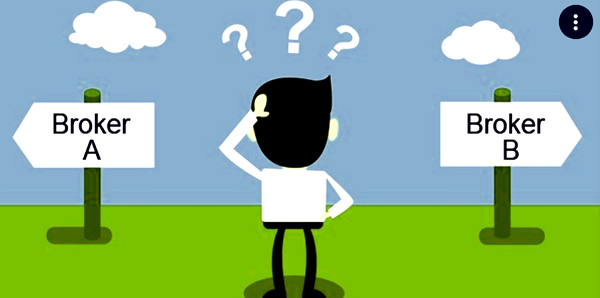The stock broker is a society who is in charge of acting as a go-between between the stock market and individuals who wish to invest.
As awareness of the stock market grows and more firms enter the stock market, the number of new brokers is growing at a similar rate to the number of new companies. This implies that there are a variety of solutions available on the market. However, one of the concerns that arises for individuals who wish to invest is how to go about selecting the appropriate ones.
And, without a doubt, the answer to this question is quite essential because it is a decision that has consequences. A thorough review of the factors leading to the selection of the person or firm who will manage our investments should be conducted before making a final decision on who or what will manage our investments.
As a result of this reality, we are interested in addressing the question of which factors to consider when selecting a stock broker. This is done in order for you to have a point of reference and to establish a criterion that will allow you to make the best selection possible, and that this will add value to your investment management.

When it comes to stockbrokers, what exactly is expected of them?
Before you can hire a stock broker, you must first determine what you expect him to do for you. So, you’ll know what criteria to use while selecting them.
In particular, a stockbroker is expected to be able to bargain on your behalf and to comprehend your needs. That is to say, you must be able to listen, understand, and interpret what you are hearing in order to design a strategy that will allow you to achieve your goals. The fact that you are not looking out for your own interests does not imply that you are.
It is critical to remember that the relationship with these people is not one of friendship, but rather one of business; as a result, they strive to gain from your relationship in the same manner that you seek to benefit from theirs. This has the advantage of being a two-way street in the ideal scenario. It all starts with you, the individual.
The amount to which their interests are served to the same extent that yours are satisfied That is not to say that there aren’t those that operate in a different manner. Generally speaking, though, the aim is that, if your needs are met, the stockbroker’s requirements will also be met as well.
Instructions for Choosing a Stock Broker

Taking into consideration the significance of expectations, I’m going to offer you with some tips that you should consider when selecting a stock broker if you decide to make an investment in the stock market.
And, as I always emphasise, these principles are not intended to be exhaustive. They are merely a frame of reference, a starting point from which you can create the criteria that will guide your decision-making. There may be more considerations that I have not addressed here that you may like to take into consideration when selecting your stock broker.
1. First and foremost, understand how to explain
The stock market has a reputation for being “tricky.” One of the most common sources of confusion for the general public is the large number of words, formulas, and methodologies that are used. And you should be aware of what you are investing in and how it operates so that you can determine whether or not the move is good for you.
In other words, during the course of the conversation you have with your broker, you should say the following, in the words of lawyer Joseph Miller from the film Philadelphia: “Explain it to me as if I were four years old,” or anything along those lines.
Obviously, you must conduct preliminary study in order to gain a general understanding, and this should be done prior to beginning the investment process. The expert on these subjects, on the other hand, must communicate all they intend to do in a clear, exact, and simple manner. The ramifications of each decision, as well as what to expect as a result of it.

It is not a magic ball that you are holding in your hand in relation to any of this. And things can go wrong at any time. However, even if things go wrong, if the plan was followed and the results were as expected, even if the outcome was negative, it was still a strategic move, and as such, it was taken into consideration; therefore, there had to be a contingency plan in place to deal with the situation.
As a result, when selecting a stock broker, consider the manner in which they communicate information to you. In order for you to be able to make your decision, you must have the necessary parts of judgement.
2. Prepare for the worst-case scenario

A smart stockbroker has plans in place in case something goes wrong with the investments he makes. You must constantly keep in mind that any investment entails some level of risk. And, as we previously stated, risk is defined as when things do not turn out the way you anticipate them to in a bad way.
As a result, when the broker asks you what they intend to do with your money, he must explain to you what is conceivable and, based on that explanation, he must present you with many scenarios from which you can select the one that best matches your needs.
And I want to highlight that you are the one who makes the decision, not the stockbroker. Because, at the end of the day, it is your money and your earnings that are on the line, it is critical to stress this point. In other words, it is not the case that you simply hand over your money and walk away.
You must, on the contrary, be aware of what is taking place and how things are progressing. To assess if it is a good fit for you or not, or to determine what prospects may exist in a different sort of investment.
This is why, if he has not already done so, you should urge him to explain and provide alternatives, and that those options are within a risk tolerance range that is appropriate for the risk that you are taking on with each investment.
3. Establishing a Good Name

The third guideline is concerned with a company’s reputation. The cumulative advantages of this particular stockbroker or that particular stockbroker Intelligence pertaining to finances
This is a hard matter because when people discuss reputation, they frequently allude to ancient stock exchanges, yet in the 2008 financial crisis, “those who caused the problem” were not new enterprises. It does, however, have a well-deserved reputation.
The reality is that it is necessary to analyse which stock brokers have the highest ratings and the best performance within the scope of information available to you in order to make the most educated decision possible.
This does not exclude you from engaging in discussions with a new stockbroker who has entered the market; however, the risk increases to the extent that he has a worse reputation because you do not know what he is capable of offering to you. All of this was made possible by the fact that all of the runners had to be new at some point. In addition, they must account for the inherent learning curve.
How to check the reputation of your stock broker?
In that case, I’m going to give you with a checklist that you may use to evaluate that broker in terms of his or her reputation in the marketplace. This is a brief checklist that you may use to assess the minimal level of reputation that a stock broker should have in order to do business with them.
- Check to see if it is a broker who is authorised to conduct business on the Stock Exchange. For this, you must approach the regulatory agency in your nation, which will verify that it is, first and foremost, certified, and, second and foremost, up to date with all of the stock market’s responsibilities.
- Consult with subject matter experts. Identify people in positions of influence in society who are familiar with the world of the stock market and who can advise you on which stock broker to hire. This can be accomplished through the use of the internet, email, and social networking sites. Gather this information and use it to build an opinion about the broker.
- Examine your investment portfolio. Examine the types of accounts he is in charge of. The risk increases in proportion to the number of less prestigious accounts that you have. However, this does not imply that all of your accounts must be elites, as no new accounts will be granted access to these accounts. However, it takes into consideration which companies are being negotiated as well as whether or not these companies have a certain level of market reputation.
